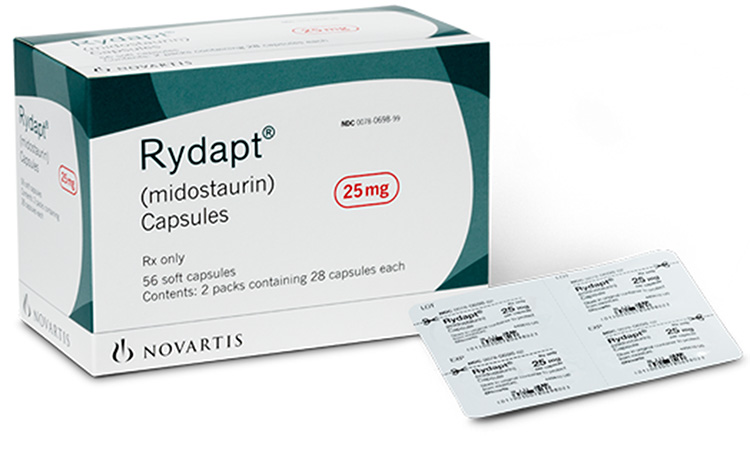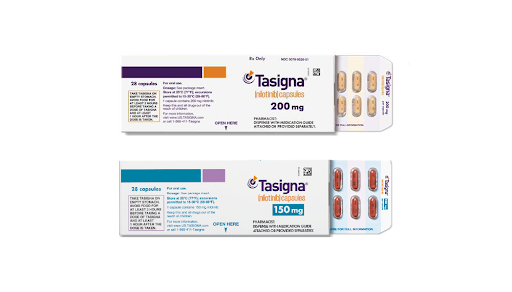Rydapt (midostaurin) vs Tasigna (nilotinib)
Rydapt (midostaurin) vs Tasigna (nilotinib)
Rydapt (midostaurin) is a multi-targeted kinase inhibitor approved for the treatment of acute myeloid leukemia (AML) with a specific genetic mutation (FLT3) and for adults with advanced systemic mastocytosis, whereas Tasigna (nilotinib) is a selective BCR-ABL tyrosine kinase inhibitor primarily used for the treatment of chronic myeloid leukemia (CML). Midostaurin works by inhibiting multiple enzymes that promote cell growth, which can be beneficial in treating certain types of cancer by preventing the proliferation of cancer cells, while nilotinib targets a specific enzyme linked to CML, leading to reduced growth of cancer cells in this condition. The choice between Rydapt and Tasigna would largely depend on the specific type of leukemia a patient has, the presence of certain genetic mutations, and the patient's overall health and treatment goals, as determined by their healthcare provider.
Difference between Rydapt and Tasigna
| Metric | Rydapt (midostaurin) | Tasigna (nilotinib) |
|---|---|---|
| Generic name | Midostaurin | Nilotinib |
| Indications | Acute Myeloid Leukemia (AML), Mastocytosis | Chronic Myeloid Leukemia (CML) |
| Mechanism of action | Protein kinase inhibitor | BCR-ABL tyrosine kinase inhibitor |
| Brand names | Rydapt | Tasigna |
| Administrative route | Oral | Oral |
| Side effects | Febrile neutropenia, nausea, mucositis, vomiting, headache | Rash, pruritus, nausea, fatigue, headache, constipation |
| Contraindications | Hypersensitivity to midostaurin or excipients | Hypersensitivity to nilotinib or excipients, long QT syndrome |
| Drug class | Protein kinase inhibitor | Tyrosine kinase inhibitor |
| Manufacturer | Novartis | Novartis |
Efficacy
Rydapt (Midostaurin) Efficacy in Leukemia
Rydapt, known generically as midostaurin, is a kinase inhibitor approved by the FDA for the treatment of adult patients with newly diagnosed acute myeloid leukemia (AML) that is FLT3 mutation-positive, as detected by an FDA-approved test. This medication is used in combination with standard cytarabine and daunorubicin induction and cytarabine consolidation. Clinical trials have demonstrated that patients with FLT3 mutations treated with Rydapt in combination with chemotherapy had a significant improvement in overall survival compared to those treated with chemotherapy alone. The efficacy of Rydapt was established in a randomized, double-blind, placebo-controlled trial (RATIFY) which showed a median overall survival of 74.7 months for patients receiving Rydapt plus chemotherapy, compared to 25.6 months for those receiving placebo plus chemotherapy.
Tasigna (Nilotinib) Efficacy in Leukemia
Tasigna, or nilotinib, is a tyrosine kinase inhibitor specifically approved for the treatment of chronic phase and accelerated phase Philadelphia chromosome-positive chronic myelogenous leukemia (CML) in adult and pediatric patients. It is particularly effective for patients who are resistant or intolerant to prior therapy, such as imatinib. In clinical studies, Tasigna has shown high rates of complete cytogenetic response (CCyR) and major molecular response (MMR) in patients with newly diagnosed CML. The five-year follow-up data from the ENESTnd trial indicated that patients treated with Tasigna had deeper molecular responses and improved progression-free survival rates compared to those treated with imatinib.
Both Rydapt and Tasigna represent significant advances in the targeted treatment of specific types of leukemia, with their efficacy being closely associated with certain genetic mutations present in the leukemia cells. The use of these drugs is a prime example of precision medicine, where treatments are tailored to the genetic profile of the patient's cancer, potentially leading to better outcomes. However, it is essential for patients to undergo appropriate diagnostic testing to determine the presence of the relevant genetic markers that would indicate the use of Rydapt or Tasigna as a treatment option.
It is important to note that while these medications have shown efficacy in the treatment of certain types of leukemia, they are associated with various side effects and may not be suitable for all patients. Healthcare providers should evaluate the potential benefits and risks of these medications on an individual basis and monitor patients closely during treatment. Additionally, patients should be informed about the possible side effects and advised to report any adverse reactions to their healthcare provider.
Regulatory Agency Approvals
Rydapt
-
European Medical Agency (EMA), European Union

-
Food and Drug Administration (FDA), USA

-
Health Canada

-
Therapeutic Goods Administration (TGA), Australia

-
Medsafe (NZ)

Tasigna
-
European Medical Agency (EMA), European Union

-
Food and Drug Administration (FDA), USA

-
Health Canada

-
Pharmaceuticals and Medical Devices Agency (PMDA), Japan

-
Therapeutic Goods Administration (TGA), Australia

-
Medsafe (NZ)

Access Rydapt or Tasigna today
If Rydapt or Tasigna are not approved or available in your country (e.g. due to supply issues), you can access them via Everyone.org.
How it works

Make an enquiry
Choose the medicine you want to buy, answer a couple of questions, and upload your prescription to speed things up. We’ll get back to you within 24 hours.


Make an enquiry
Choose the medicine you want to buy, answer a couple of questions, and upload your prescription to speed things up. We’ll get back to you within 24 hours.


Breeze through the paperwork
We'll guide you through the required documents for importing unapproved medicine, ensuring you have all the necessary information.


Get a personalized quote
We’ll prepare a quote for you, including medicine costs and any shipping, administrative, or import fees that may apply.


Receive your medicine
Accept the quote and we’ll handle the rest - sourcing and safely delivering your medicine.

Some text on this page has been automatically generated. Speak to your physician before you start a new treatment or medication.
Let's talk
If you have any questions, call us or send us a message through WhatsApp or email:
Contact us




